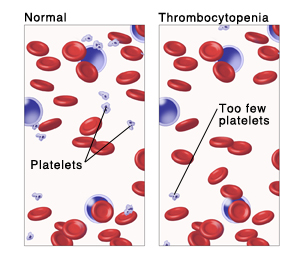Source: Thailand Medical News Dec 22, 2019 5 years, 3 months, 1 week, 4 days, 21 hours, 55 minutes ago
The anticlotting agent
Heparin is frequently employed to mitigate the risk of
clot formation in the leg veins following surgery, to treat venous thromboses and to prevent thrombotic occlusions of arteries in patients at risk for heart attacks. However, the agent can also lead to a reduction in the numbers of thrombocytes (otherwise known as platelets) in the bloodstream, an effect known as
heparin-induced
thrombocytopenia (HIT). Up to 3% of patients who are treated with heparin develop an immunologically triggered subtype of HIT (called type II HIT), which is surprisingly associated with an increase in the incidence of thromboses (clots) in the blood vessels that are potentially life-threatening.

The presence of platelets into the blood clots explains the occurrence of
thrombocytopenia. A new study directed by Dr Wolfgang Siess, Professor of Cardiovascular Pathobiochemistry at Ludwig Maximilian University of Munich
(LMU) Institute for Prophylaxis and Epidemiology of Cardiovascular Diseases (IPEK), has now demonstrated that this hazardous side-effect can be effectively prevented in vitro by the inhibition of a specific enzyme.
The discovery provides a new option for the treatment of type II HIT. The study was carried out in collaboration with research groups led by Professor Michael Spannagl (Department of Transfusion Medicine, Cell Therapeutics and Hemostaseology, LMU Medical Center), Professor Christian Weber and Dr. Philipp von Hundelshausen (both IPEK). The new findings appear in the journal Blood Advances.
The structure of
Heparin is such that it is a large, negatively charged linear polysaccharide made up of a variety of repeat units. Type II HIT is caused by the formation of antibodies that are directed against a specific molecular complex made up of heparin and a protein called PF4, which is secreted by platelets. The so-called Fc domain of the antibodies binds to the corresponding Fc receptor found on the platelet surface, which results in activation of the cells.
Typically, the activated platelets form aggregates and secrete proteins which mediate the binding of platelets (thrombocytes) to the inner surface of the blood vessels (endothelium) and to certain types of white blood cells (monocytes and neutrophils). This leads to the formation of thrombin and fibrin, and together with platelet activation triggers clot formation. Hence, heparin actually provokes the effect that it is intended to inhibit. "The complex pathogenesis of type II HIT is quite well understood, but the standard therapy of the disorder is suboptimal," says Dr Siess.
A past study had shown that activation of the Fc receptor on the thrombocyte membrane induces activation of an enzyme known as
Bruton's tyrosine kinase (
Btk).
Dr Siess explained to
Thailand Medical News via a phone interview, "We therefore asked whether
inhibitors of
Btk might be able to reduce the downstream activation of thrombocytes triggered by stimulation of the Fc receptor. We found
that each of the six
Btk inhibitors we tested was indeed able not only to reduce but to completely block Fc-receptor induced platelet aggregation and secretion in blood. In addition, they all blocked the interaction of thrombocytes with neutrophils, thus preventing the formation of potentially harmful thrombosis. This was a very pleasant surprise for us, as earlier investigations had shown that
Btk inhibitors could only partially block platelet activation induced by stimulation of a different receptor."
Btk Inhibitors therefore offer a new promising therapeutic option for type II HIT, as they target an early and crucial step in the process that gives rise to the disorder. The inhibitors employed in the study have the additional advantage that they have either been approved for the treatment of other diseases, or have been successfully tested in clinical trials.
Reference : Luise Goldmann et al. Oral Bruton tyrosine kinase inhibitors block activation of the platelet Fc receptor CD32a (FcγRIIA): a new option in HIT?, Blood Advances (2019). DOI: 10.1182/bloodadvances.2019000617
